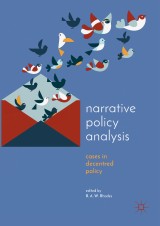Details

Narrative Policy Analysis
Cases in Decentred PolicyUnderstanding Governance
|
CHF 136.00 |
|
| Verlag: | Palgrave Macmillan |
| Format: | |
| Veröffentl.: | 24.05.2018 |
| ISBN/EAN: | 9783319766355 |
| Sprache: | englisch |
Dieses eBook enthält ein Wasserzeichen.
Beschreibungen
<div>Narratives or storytelling are a feature of the everyday life of all who work in government. They tell each other stories about the origins, aims and effects of policies to make sense of their world. These stories form the collective memory of a government department; a retelling of yesterday to make sense of today. This book examines policies through the eyes of the practitioners, both top-down and bottom-up; it decentres policies and policymaking. To decentre is to unpack practices as the contingent beliefs and actions of individuals. Decentred analysis produces detailed studies of people’s beliefs and practices. It challenges the idea that inexorable or impersonal forces drive politics, focusing instead on the relevant meanings, the beliefs and preferences of the people involved. </div><div><br></div><div>This book presents ten case studies, covering penal policy, zero-carbon homes, parliamentary scrutiny, children’s rights, obesity, pension reform, public service reform,evidence-based policing, and local economic knowledge. It introduces a different angle of vision on the policy process; it looks at it through the eyes of individual actors, not institutions. In other words, it looks at policies from the other end of the telescope. It concludes there is much to learn from a decentred approach. It delivers edification because it offers a novel alliance of interpretive theory with an ethnographic toolkit to explore policy and policymaking from the bottom-up.</div><div><br></div><div>Written by members of the Department of Politics and International Relations of the University of Southampton, with their collaborators at other universities, the book’s decentred approach provides an alternative to the dominant evidence–based policy nostrums of the day. </div><div></div>
<p>Chapter 1-What is Decentred Analysis?-R. A. W. Rhodes.- Chapter 2-What is Penal Policy? Traditions and Practices in the UK Ministry of Justice-Harry Annison.- Chapter 3-What Makes a Zero Carbon Home Zero Carbon?-Heather Lovell and Jack Corbett.- Chapter 4-What are the Hidden Dimensions to Parliamentary Scrutiny - the Ghosts in the Machine?-Tony McNulty.- Chapter 5-How Are Children’s Rights (Mis) Interpreted in Practice? The European Commission, Children’s Rights and Policy Narratives-Ingi Iusmen.- Chapter 6-How Do You Go From Demonizing Adversaries to Deliberating With Them?-John Boswell.- Chapter 7-How Have Narratives, Beliefs and Practices Shaped Pension Reform in Sweden?-Karen Anderson.- Chapter 8-What are the Consequences of Incessant Reform? Losing Trust, Policy Capacity and Institutional Memory in the Queensland Core Executive-Anne Tiernan.- Chapter 9-How do Local Government Chief Executives Engage with Policy Dilemmas?-Kevin Orr and Mike Bennett.- Chapter 10-How do the Police Respond to Evidence Based Policing?-Jenny Fleming.- Chapter 11-What do UK Citizens Understand about Austerity?-Anna Killick.</p>
<div>R. A. W. Rhodes is Professor of Government at the University of Southampton, UK. Previously, he was the Director of the UK Economic and Social Research Council’s ‘Whitehall Programme’ (1994-1999); Distinguished Professor of Political Science at the Australian National University (2006-11); and Director of the Research School of Social Sciences at the Australian National University (2007-8). In 2015, the ECPR awarded him its biennial Lifetime Achievement Award for his ‘outstanding contribution to all areas of political science, and the exceptional impact of his work’.</div>
This book examine polices through the eyes of the practitioners, both top-down and bottom-up; it decentres policies and policymaking. To decentre is to unpack practices as the contingent beliefs and actions of individuals. Decentred analysis produces detailed studies of people’s beliefs and practices. It challenges the idea that inexorable or impersonal forces drive politics, focusing instead on the relevant meanings, the beliefs and preferences of the people involved. <div><br></div><div>The book presents ten case studies, covering penal policy, zero-carbon homes, parliamentary scrutiny, children’s rights, obesity, pension reform, public service reform, evidence-based policing, and local economic knowledge. It introduces a different angle of vision on the policy process; it looks at it through the eyes of individual actors, not institutions. In other words, it looks at policies from the other end of the telescope. It concludes there is much to learn from a decentred approach. Itdelivers edification because it offers a novel alliance of interpretive theory with an ethnographic toolkit to explore policy and policymaking from the bottom-up.</div><div><br></div><div>Written by members of the Department of Politics and International Relations of the University of Southampton, with their collaborators at other universities, the book’s decentred approach provides an alternative to the dominant evidence–based policy nostrums of the day.<br></div><div><br></div><div><b>R. A. W. Rhodes</b> is Professor of Government at the University of Southampton, UK. Previously, he was the Director of the UK Economic and Social Research Council’s ‘Whitehall Programme’ (1994-1999); Distinguished Professor of Political Science at the Australian National University (2006-11); and Director of the Research School of Social Sciences at the Australian National University (2007-8). In 2015, the ECPR awarded him its biennial Lifetime Achievement Award for his ‘outstanding contribution to allareas of political science, and the exceptional impact of his work’.<br></div>
Explains shifting patterns of policy and policy making by focusing on actors’ own interpretations of beliefs and practices Explores diverse ways in which situated agents change policies by remaking practices as their beliefs change Reveals the contingency and contestability of policy narratives Highlights both the importance of local knowledge and the diversity of policy making and its exercise
Diese Produkte könnten Sie auch interessieren:

Mapping Sustainability

von: Nazli Choucri, Dinsha Mistree, Farnaz Haghseta, Toufic Mezher, Wallace R. Baker, Carlos I. Ortiz

CHF 118.00

Fertility, Living Arrangements, Care and Mobility

von: John Stillwell, Ernestina Coast, Dylan Kneale

CHF 118.00














